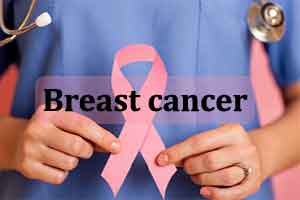- Home
- Editorial
- News
- Practice Guidelines
- Anesthesiology Guidelines
- Cancer Guidelines
- Cardiac Sciences Guidelines
- Critical Care Guidelines
- Dentistry Guidelines
- Dermatology Guidelines
- Diabetes and Endo Guidelines
- Diagnostics Guidelines
- ENT Guidelines
- Featured Practice Guidelines
- Gastroenterology Guidelines
- Geriatrics Guidelines
- Medicine Guidelines
- Nephrology Guidelines
- Neurosciences Guidelines
- Obs and Gynae Guidelines
- Ophthalmology Guidelines
- Orthopaedics Guidelines
- Paediatrics Guidelines
- Psychiatry Guidelines
- Pulmonology Guidelines
- Radiology Guidelines
- Surgery Guidelines
- Urology Guidelines
Just one alcoholic drink a day increases breast cancer risk: Study

WASHINGTON, DC -- Drinking just one glass of wine or other alcoholic drink a day increases breast cancer risk, finds a major new report by the American Institute for Cancer Research (AICR) and the World Cancer Research Fund (WCRF).
The report also revealed, for the first time, that vigorous exercise such as running or fast bicycling decreases the risk of both pre- and post-menopausal breast cancers. Strong evidence confirmed an earlier finding that moderate exercise decreases the risk of post-menopausal breast cancer, the most common type of breast cancer.
"It can be confusing with single studies when the findings get swept back and forth," said Anne McTiernan, MD, PhD, a lead author of the report and cancer prevention expert at the Fred Hutchinson Cancer Research Center.
"With this comprehensive and up-to-date report the evidence is clear: Having a physically active lifestyle, maintaining a healthy weight throughout life and limiting alcohol -- these are all steps women can take to lower their risk."
Brisk Walking, Alcohol and Breastfeeding
Diet, Nutrition, Physical Activity and Breast Cancer systematically collated and evaluated the scientific research worldwide on how diet, weight and exercise affect breast cancer risk in the first such review since 2010. The report analyzed 119 studies, including data on 12 million women and 260,000 cases of breast cancer.
The report found strong evidence that drinking the equivalent of a small glass of wine or beer a day (about 10 grams alcohol content) increases pre-menopausal breast cancer risk by 5 percent and post-menopausal breast cancer risk by 9 percent. A standard drink is 14 grams of alcohol.
For vigorous exercise, pre-menopausal women who were the most active had a 17 percent lower risk and post-menopausal women had a 10 percent lower risk of developing breast cancer compared to those who were the least active. Total moderate activity, such as walking and gardening, linked to a 13 percent lower risk when comparing the most versus least active women.
In addition the report showed that:
- Being overweight or obese increases the risk of post-menopausal breast cancer, the most common type of breast cancer.
- Mothers who breastfeed are at lower risk for breast cancer.
- Greater adult weight gain increases risk of post-menopausal breast cancer.
Breast cancer is the most common cancer in US women with over 252,000 new cases estimated this year. AICR estimates that one in three breast cancer cases in the U.S. could be prevented if women did not drink alcohol, were physically active and stayed a healthy weight.
Emerging Findings: Dairy and Veggies
The report points to links between diet and breast cancer risk. There was some evidence -- although limited -- that non-starchy vegetables lowers risk for estrogen-receptor (ER) negative breast cancers, a less common but more challenging to treat type of tumor.
Limited evidence also links dairy, diets high in calcium and foods containing carotenoids to lowering risk of some breast cancers. Carrots, apricots, spinach and kale are all foods high in carotenoids, a group of phytonutrients studied for their health benefits.
These links are intriguing but more research is needed, says McTiernan. "The findings indicate that women may get some benefit from including more non-starchy vegetables with high variety, including foods that contain carotenoids," she said. "That can also help avoid the common 1 to 2 pounds women are gaining every year, which is key for lowering cancer risk."
Steps Women Can Take
Aside from these lifestyle risk factors, other established causes of breast cancer include being older, early menstrual period and having a family history of breast cancer.
While there are many factors that women cannot control, says Alice Bender, MS, RDN, AICR's Head of Nutrition Programs, the good news from this report is that all women can take steps to lower their breast cancer risk.
"Wherever you are with physical activity, try to nudge it up a bit, either a little longer or a little harder. Make simple food shifts to boost protection -- substitute veggies like carrots, bell peppers or green salad for chips and crackers and if you drink alcohol, stick to a single drink or less," said Bender.
"There are no guarantees when it comes to cancer, but it's empowering to know you can do something to lower your risk."

Disclaimer: This site is primarily intended for healthcare professionals. Any content/information on this website does not replace the advice of medical and/or health professionals and should not be construed as medical/diagnostic advice/endorsement or prescription. Use of this site is subject to our terms of use, privacy policy, advertisement policy. © 2020 Minerva Medical Treatment Pvt Ltd